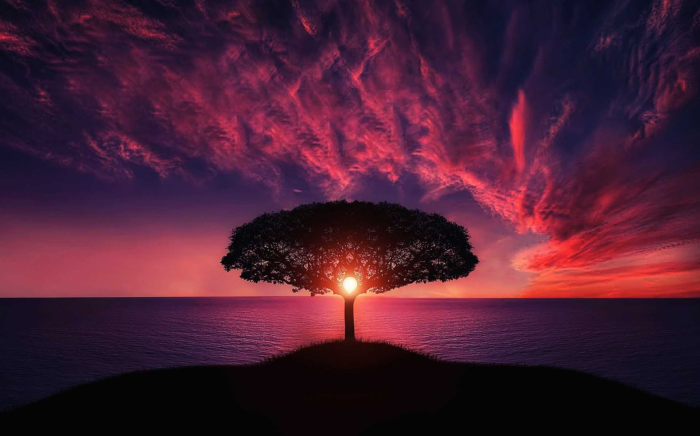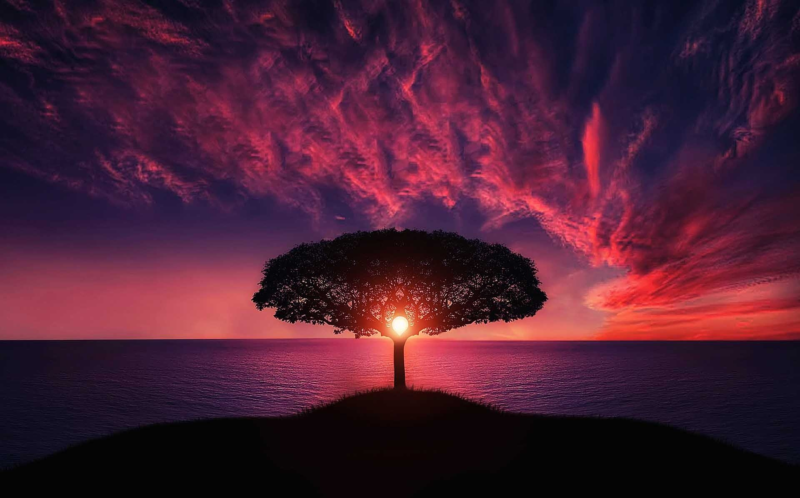Welcome to the first post of February 2020, written by a brave and deeply wise individual that I have so much respect for: Melissa Hill. This post kicks off a column by Melissa called Practical Animism, and you can expect to read more from her on a regular basis. Don’t forget to subscribe by email so that you don’t miss any post notifications! – Nix Kelley, Editor & Contributor
A Pathway to Animism
Animism is to believe that all things have a soul, but what does that even mean? In a Christian methodology, it is only humans who have soul, defined as an animating feature of the body that makes us somehow more god-like than other species. Of course, that statement also has assumptions embedded within it: what is “god”, and how is one more or less “god-like”? It is easy to say these words and think we make sense because we are used to hearing them. That’s narrative, culture, and communication. It’s the beauty and horror of humanity. We make up stories, tell them to ourselves, and eventually, we believe they are true.
So how does one find truth? What is truth? One might as well ask what is good or bad? What is beautiful?

We live in a complicated contextual reality where there is always more than one answer. However, I have decided to live within the confines of a couple of suppositions. I have found that it has been deeply clarifying for my personal existence. I have developed four principles that underly much of my thought, ethics, and choice-making processes. It has been the work of my lifetime, thus far. I would present these principles as a possible addition to your own ethical and theological framework, but first, let me share a bit of my own history.
Struggling Out of Existential Crisis
When I was a young adult I struggled with depression and was suicidal. I didn’t talk about it much. I knew that killing myself was a bad idea so I came up with all sorts of tricks for surviving my own mind. Sometimes I’d just tell myself that next week, if it was bad enough, I’d end it, and then just keep telling myself that, every single week. Sometimes I lived for my mother who had cancer. Sometimes I lived for my friends. Sometimes I lived because the sunrise was particularly beautiful. I survived through high school and college on temporal trickery and hope. My family wasn’t much for therapists.
Eventually, I pulled out of depression and moved toward a new self. I journaled and spent a lot of time thinking. Much of my life felt pointless, I had no meaning. Paganism helped, quite a bit. It gave me a community of people who thought as much as I did and ways to express and process emotions that worked for me. However, near the end of college, I again was deeply depressed. This time it was math that saved me. I felt strongly that life was meaningless. It was random and filled with entropy. It was sound and fury signifying nothing.
Meaning as Mathematics
It occurred to me: if all life was meaningless, all life was equivalent. It all was the same. I assumed then that all meaning equaled nothing. I knew what nothing was, it was zero. If meaning = zero, then meaning was an algebraic equation and I could manipulate it.
I could let meaning be equally large or small. All algebraic equations require balance. If you add 100 to one side you must do the same thing to the other side. All meaning could just as easily be valued at one hundred or one thousand units of meaning. Whatever that unit might be. The important part was the logic behind it.
If all life was equally meaningless, then all life and options were equally meaningful. While other belief systems including hard sciences, psychology, Christianity and even Paganism had opinions on what was meaningful and what was less meaningful, I could bypass all that by assuming equal meaning. It allowed me to have a level playing field in my mind, and more importantly, I could assign meaning where I chose to bestow it.

This was the beginning of a very long journey toward the knowledge that I now have. In order to come to the understanding that I have, I had to allow myself to experience reality without predefined assumptions. As humans embedded within a culture we have an innate sense of ethics gifted to us by our parents, the media, school, all our moments of interaction. This basic ethics appears quite early in human development.
Human Development and Ethics
It is the ability to self-reflect that gives us the chance to change and examine those early impressions. This is what allows us to move past basic rules-based ethics into a more complex contextual ethic. It was the psychologist Piaget, in 1936, who named this change from a rules-based understanding to complex understanding as to the movement from concrete operational thinking to formal operational thinking. This occurs somewhere in the pre-teen or teen years. It is the time of life when you realize the rules you’ve been given don’t fit your own internal logic of what good is.
We know that this desire to live a good life is found universally in cultures across the world from Aristotle’s ethics to the Vedic philosophers, to the embedded culture and history of the Aboriginal Dreamtime songs. I, too, wanted to live a good life, a positive and helpful life. I did not believe that the American white Midwest culture I had been raised in was going to help me do so.
Animism: the spiritual and religious belief that all of physical matter has an aspect that is aware and of equal importance with all other matter. All of the material world has a spiritual dimension and is holy.
Applied Animism
After years of research and experimentation, I have found that there are four assumptions or principles that ground my spiritual experience. By doing so, I have a foundation that I can build from in order to experiment with new thought forms and models of understanding. Recently I gave up my clergy status in ADF, a Neo-Pagan polytheistic druid church. It has freed me to go back to my most basic understanding of spirituality: animism.
I have added the idea of “practical” to my animism. That is because I am goal-driven. Unlike my younger self, I am immersed in the culture of a better world, one that is filled with words like consent, sustainability, and social justice. I am deeply practical because my life is filled with meaning built from experience. From that meaning derives my action in The Great Work, which many are doing. We are transforming our cultures into something better for ourselves and our fellow species on this planet. I am a practical animist because I apply these principles in my work every day. My work is not theoretical, it is grounded in action and thusly, practical.

The Four Principles of Practical Animism:
All of the physical material world is worthy of reverence and respect.
This includes the animate and non-animate worlds. The corollary of this is that all animate and non-animate material existence has soul or inherent divinity and spirit. All of existence is holy.
Again the simple math of assuming that all things are equal is helpful here. If we assume that anything in existence has “soul” then all things do. I prefer to live in a world where there is inherent sacredness. My experiences and research indicate that humans are happier and healthier when we have a belief in something larger than ourselves. Gods and goddesses can be understood in this context as well as aspects of the material world that have become part of human narrative. Speaking of narrative….
Humans need stories and narratives in order to be sane.
We use stories and narrative to be able to think about the world. That’s how the human brain functions. These are the assumptions we make about how the world work. They can take infinite forms and can be incredibly simple or complex. “Science is the only way to understand reality” is a story. It’s a way of understanding and organizing the data that our senses perceive. “Jesus is our lord and savior.” is another narrative, a way of viewing reality.
These stories are like the Operating System for our brains. Some of us are Macs or PCs, or even Linux. We have many more operating systems than computers do. Quite a few people run on Hogwarts OS these days. Self-awareness of our chosen narratives is key to understanding our experiences in the world. We take in information through our senses, and then we make sense of it in our mind. Knowing that we cannot escape from bias allows us to begin to take control of our biases and see the soul-filled world a little more clearly and honestly.
There are many ways to understand reality
Our ways of understanding are tools, like lenses we look through. Science and metaphor are both important. Narrative and logic teach us differently. Each viewpoint has its uses and flaws. Metaphor connects with intuition and the deep self. It is a way of understanding concepts that are at the edge of understanding. Scientific methodology helps us organize information and carefully find patterns. Logic helps us guess what might come next. It is deeply important to remember that all the ways we have to understand reality are not reality itself. We can never completely understand reality, however, the attempt is worth it.
By looking at belief and thought systems as tools, we can move between them and examine our own biases more thoroughly. We can hope to see a fuller picture of what is actually happing in our lives and our ecosystems. As an animist, magician, or spiritworker the ability to shift into different modes of understanding allows you to interact with the spiritual and imaginal planes in an active way, rather than reacting to what you experience. You can move from concrete operations into formal operations.
By shifting lenses and using them as tools, you can understand the interaction of the psychological, emotional, energetic and mythological viewpoints.
We are at the crux of a shift in paradigm
We have entered the Anthropocene: the time when humanity is the primary shaping force on the Earth. In some ways, we have become the gods we told stories about in the ancient days. We live in the years of fire and storm. Each spring the cherry blossoms come sooner. Each summer is on average hotter. Each year the storms are stronger, the fires longer.

We use the words Global Warming. What might be more accurate is Global Weirding. The weather is getting hotter. Also colder. Simultaneously dryer and wetter, with larger and more powerful storms. For better or worse we have affected the global climate, created vast die-off of species, and have forever transformed our ecosystems. With great power comes great responsibility. We are living with the choice to become superheroes or supervillains. In order to survive, we must learn to use our powers successfully and rebalance what we have already done.
Joanna Macy refers to this transition to a new sustainable culture as “The Great Turning”. In some ways, it is an exciting time. There is so much to be done. My ongoing work has been to combine modern knowledge of psychology, horticulture, sustainability, and ecology with ancient lore, mythology and archeology. I look for where the two intersect and reinforce one another with the idea that our ancient ancestors were as intelligent and as wise as we are now. By looking at the most modern knowledge and comparing it with our ancient understandings we can triangulate on profound truths.
Animism is one of those deep intersections. Both science and ancient practices reinforce the idea that all of existence is sacred and worthy of reverence. Humans are merely one species among many brothers and sisters, descendants of species who came before us. It is a way of thinking that leads to healthy outcomes for more than just humans. As a spirit worker, artist, and organic farmer I have personally experienced this sacred interaction of all things. It is a deep and profound truth, that much of modern archeology, sociology, and theology relegates to the backwaters of learning. Animism is seen as something only “primitive peoples” believe as if that was a bad thing. When one lives in a mentally ill culture, the assumptions that even scholars make are suspect.
The world is alive. Rocks can speak, and plants have much wisdom to share. Learning to listen to their words and lessons can be one of the most profoundly transforming experiences one can have. I encourage you to open your heart and your mind to the spirits that surround you. They are everywhere, in everything all the time. It is only that we have forgotten how to listen.

References:
Abram, David (1996) The Spell of the Sensuous. Random House Publishing.
Beach, L. R., Bissell, B. L., & Wise, J. A. (2016). A New Theory of Mind: The theory of narrative thought. Newcastle-upon-Tune, UK: Cambridge Scholars Publishing.
Buhner, Stephen Harrod. (2004) The Secret Teachings Of Plants: in the direct perception of nature. Bear & Company.
Greer, John Michael (2008) The Long Descent. New Society Publishers.
Seed, John, Macy, Joanna, Fleming, Pat, and Naess, Arne. (2007) New Catalyst Books.
Vaughan-Lee, Llewellyn (2013) Darkening of the Light: Witnessing the End of an Era. The Golden Sufi Center.
Credits
All photos used in this post courtesy of Adobe Spark Post.
